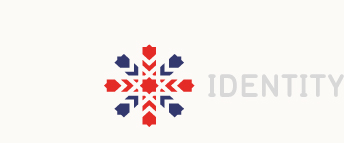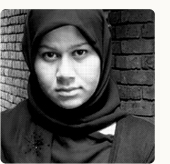

British Muslims
European Muslims
Originated From
Age & Sex
Places of Worship
Ethnic Groups
Defining Identity
What they Say
Profession of Faith
Praying
Social Responsibility
Fasting
Pilgrimage
Muslims in Britain
Impact of Media
Islamophobia
Identity
British & Muslims
Surveys
Interviews
Auto Photography
Interviews
Capturing identity
In primary research, one of the questions asked to young prominent British Muslims was; do you feel you can be British and Muslim? All the interviewees agreed that being Muslim and British was not an issue to them, as being both was not mutually exclusive. To them, people who bring up the question of identity about Muslims are usually those trying to exploit and divide Muslims for their specific agendas.
Media

Tamanna Rahman
Young journalist of the year
BBC journalist
How do you feel British Muslim identity is branded in the media?
I can only really speak from what I see in news, because I don’t really watch soaps or read books or articles about Muslims and Islam. Frankly because I’m bored of reading or hearing about Muslims. Within news if there’s a story about Muslims often they will show a woman in a niqab or burqa, which is a lazy journalist’s shorthand. Sometimes they might do a woman in a headscarf or a man in a beard. Never any Muslim who blends into the crowd. As news tends to deal only with bad things, that pretty much puts anyone who wears the outward manifestation of their faith on a poor footing.
What impact does such labelling and branding of young Muslims have on the perceptions and attitude in British Society?
You’d have to ask British Society. I can see how people might associate all who wear such clothes or facial hair as illiterate benefit scroungers who want to blow up the western world. I also think that it might make Muslims angry about being represented in such a one dimensional way. Pictures speak louder than words and regardless of how you qualify the actions of one person within a script, the headline picture will usually leave a negative perception. This in turn might make Muslims want to prove their loyalty more by being obedient servants of the Her Majesty, fearing that any criticism they have will be taken out of context. That’s how I feel sometimes anyway.
You rarely see Muslims visibly in a positive story (Tariq Jehan is a notable exception, but his religion was played down), so I suppose that it means people don’t see the nuances of many communities living together. It’s not a good thing if people see Muslims as one homogenous group – that’s dangerous.
However, I also like to think most of British Society is not so simplistic, and also appreciates what it means to be Muslim from the people they see around them. Actions speak louder than words and pictures.
Do you believe multiculturalism has failed in Britain?
You would have to define multiculturalism, because it has different meanings depending on who you speak to. Community difficulties arise most notably in areas where there is associated social and economic deprivation. Where there is opportunity and mixed communities, the statistics don’t suggest different cultures pose a problem. The government needs to be bold in the application of the laws of the land in relation to things like marriage and education and not be afraid of clamping down where Human Rights are being violated. But it also needs to work harder to encourage business, social mobility and growth – this is much effective, but costly and much more long term. Multiculturalism hasn’t failed Britain – it’s just become a scapegoat for bigger problems faced by everybody, leading to rising tensions.
How do you think Muslims can better engage with the media?
There needs to be an understanding that media is an umbrella term for quite a large basket of consumables. It’s anything that is viewed or heard by any individual. I think the first thing Muslims should do is understand that it’s an industry as wide ranging as education or the economy and there are bits of it that are good and bits that aren’t so good. But it’s there, always has been and it always will be.
Best to engage with it by getting involved behind the scenes. Also becoming a little more sophisticated in responding to instances where Muslims are represented unfairly. This can be done by attempting to make friends with journalists, producers and other media types. Also by sending in compliments where there have been good storylines and congratulating production teams. If they think you’re nice, they’re less likely to be so black and white with storylines.
Secondly, it’s not necessarily a bad thing if there are storylines that reflect on Muslims negatively – and it’s important not to take it personally or see it as a slur against Islam. It’s part of being in this society that people – from various backgrounds – are caricatured within drama and comedy. It’s a sign that you have been accepted into society to be criticised, rather than being a community that no one will touch with a bargepole out of sensitivity and, let’s face it, fear.
The more that people see the greys within the Muslim community the more sympathetic they are likely to be towards them. In the case of news however, where there has been racism or Islamophobia, it’s important to be firm, polite and provide evidence as to why a particular representation might be harmful to a group of people.
Is your faith an important factor in driving you forward in your career and why?
Representation of my faith is probably one of the main reasons I thought I should get into the media in the first place. Change from within and all that. When you work behind the scenes within a news environment you learn how a lot of decisions are made, and you become more forgiving of mistakes – particularly within the BBC where they do try and be as fair and accurate as possible. You realise that it’s ordinary people just reporting what they see with the best information they have.
So as I’ve learnt more about the process, faith as a driver has largely disappeared. It’s more about the real essence of what journalism should be about – getting as close to the truth as possible. Which rather neatly is what my understanding of faith is about as well.
What advice would you give to young Muslims wanting to have a career in the media?
Decide why you want to be in the media, and how you want to be involved. There are a multitude of ways to be involved. It’s like asking if you’d like to work in medicine. You could be a doctor, or a consultant; a practice manager or a technician. Similarly you could work in television, radio or online. You could be a reporter, or a producer; a writer or an editor; you could be a production manager, director or a cameraman.
You could work in news, or current affairs. You could work in documentaries, drama, film, comedy, entertainment, or sport. It’s an interesting and oversubscribed sector. Decide where to go – they could all do with a greater diversity in staff.
You can get your foot in the door through work experience, which is how I got in. After that, it’s sheer hard work and quite a lot of luck. If you want anything worth having you’ve got to work hard and make some sacrifices with your time and effort.
Working in the media is mostly about making relationships, so don’t count on getting very far, or doing any of the really interesting stuff if you’re a wallflower and uncomfortable with laughing at yourself or engaging in a bit of light hearted banter.
Do you feel you can be British and Muslim?
I feel this is a very odd question. I am British and Muslim. The two are not mutually exclusive. It’s not a question of “feeling”